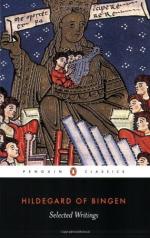|
This section contains 6,274 words (approx. 21 pages at 300 words per page) |

|
SOURCE: Frances Beer, "Hildegard of Bingen," in Women and Mystical Experience in the Middle Ages, The Boydell Press, 1992, pp. 15-55.
In the following essay, Beer provides a historical context for Hildegard's poetic and intellectual achievements, discussing the nature of life in twelfth-century Benedictine monasteries and convents and the increased credibility of the church as a moral force during this time. The critic then discusses Hildegard's life as an administrator, noting her challenges to the policies of several authoritative male figures, her "effective imperviousness to the potent medieval tradition of antifeminism," and her fundamental concern with spiritual growth.
Hildegard of Bingen, born at Bemersheim in 1098, was a figure for whom superlatives seem inadequate. Peter Dronke, for example, author of the major biographical work on Hildegard, resorts to adjectives such as 'over-powering' and 'electrifying', while Matthew Fox, one of her most ardent contemporary admirers, places her among 'the greatest intellectuals...
|
This section contains 6,274 words (approx. 21 pages at 300 words per page) |

|


